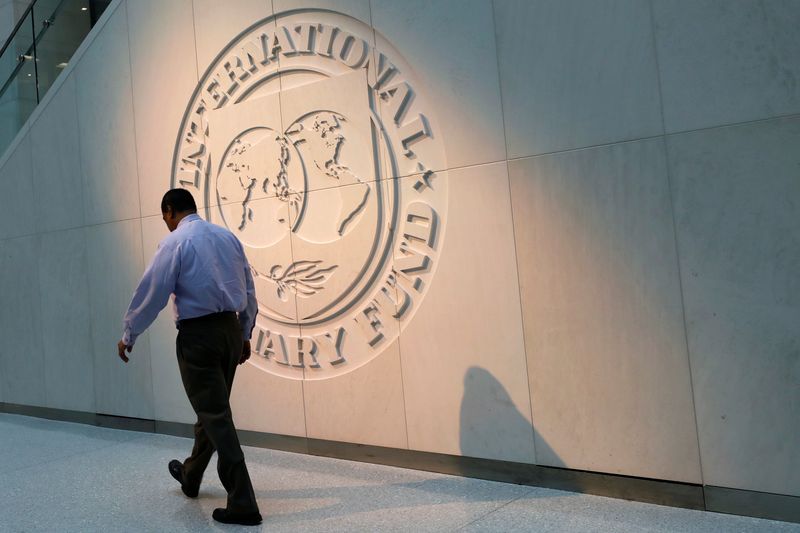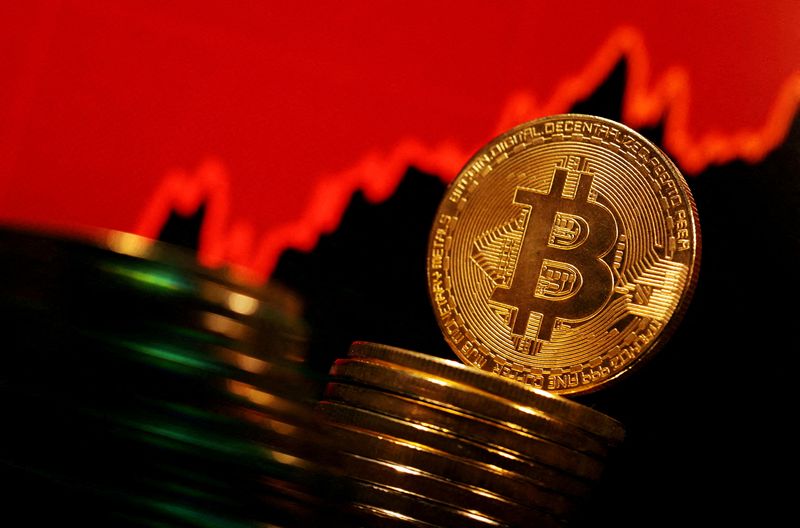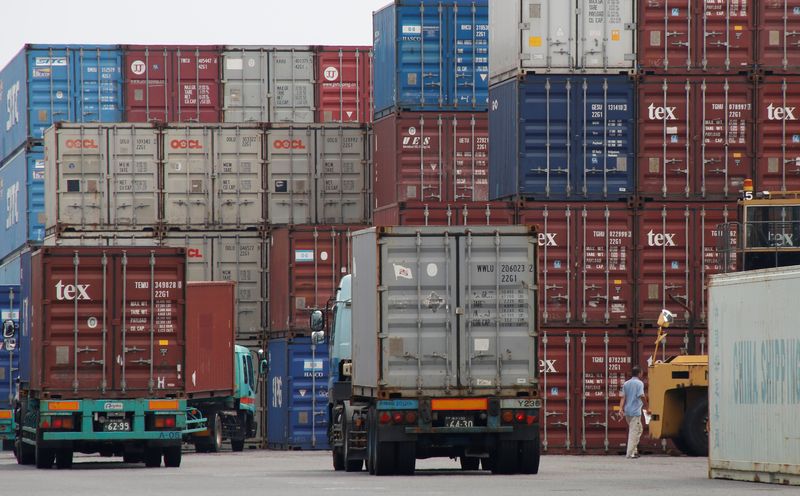Select Language

By Andrea Shalal
WASHINGTON (Reuters) - The International Monetary Fund still favors a case-by-case approach to dealing with sovereign debt issues, but is closely monitoring developments to ensure it is prepared if a more systemic approach is needed, a top official said on Thursday.
IMF strategy chief Ceyla Pazarbasioglu said the global outlook called for "relatively higher and more volatile interest rates" that would not be conducive to emerging markets being able to reduce their high debt burdens.
Pazarbasioglu said there had not been major solvency problems in emerging markets or developing countries in recent months, but she remained concerned that record global public debt and high debt servicing costs were crowding out investment in education, infrastructure or climate resilience.
The IMF official said the Group of 20 common framework for debt restructuring had helped support countries that needed debt relief, but "much more" needed to be done, including quicker and more predictable relief reaching a broader set of countries.
Creation of the Global Sovereign Debt Roundtable, which also includes the private sector and the borrowing countries, marked another step forward, but some economists questioned whether a more systemic approach was needed.
For now, the IMF favored a case-by-case approach, she said, but added that piloting some other approaches would be very important going forward.
"So in our view, we are not yet there to need some sort of a systemic approach that was used in the past. But we are monitoring the developments very carefully to make sure that we are prepared in case such approaches would be necessary," she added.
Pazarbasioglu said the median external debt service burden of emerging market countries - a key indicator for assessing whether a country might be at risk of missing a debt payment - was now about 11% of revenues, compared to 8% a decade ago.
The number was far higher for low-income countries, which spent about 14% of revenues to service their debts, up from 6% in 2013, she said.
In a separate blog published this week, the IMF said the overall funding squeeze facing low-income countries should be monitored carefully, noting that they needed to refinance about $60 billion of external debt each year, three times the average seen in the decade through 2020.
Given climate change challenges, there was a "significant risk of a liquidity crunch" which could lead to a destabilizing debt crisis, they wrote.

By Lucia Mutikani
WASHINGTON (Reuters) - The U.S. economy likely grew at its slowest pace in 1-1/2 years in the fourth quarter as businesses throttled back on inventory investment and consumer spending cooled a bit, but the pace was probably enough to have kept a recession at bay in 2023.
The Commerce Department's advance fourth-quarter gross domestic product report on Thursday, which is also expected to show inflation moderating last quarter, will reinforce expectations that the Federal Reserve will start cutting interest rates some time in the first half of this year.
"We are expecting growth to come in right in the sweet spot for the Fed," said Scott Anderson, chief U.S. economist at BMO Capital Markets in San Francisco. "Slow enough to keep downward pressure on inflation, but solid enough to keep the economy growing in the first half of 2024."
According to a Reuters survey of economists, GDP likely increased at a 2.0% annualized rate last quarter. That would be the slowest since the second quarter of 2022 and follows a 4.9% pace of acceleration in the July-September quarter. Estimates ranged from a 0.8% rate to a 2.8% pace.
The economy would still be expanding at a pace above what Fed officials regard as the non-inflationary growth rate of around 1.8%. Growth for the full year is expected to come in at about 2.5%, picking up from the 1.9% notched in 2022.
The economy has defied dire predictions of a downturn from economists and business executives since mid-2022, in part because of labor market resilience, marked by low layoffs and strong wage gains, which are underpinning consumer spending.
The Labor Department is expected to report on Thursday a moderate rise in initial claims for state unemployment benefits last week. Increased government spending as well as near zero interest rates during the COVID-19 pandemic, which allowed some corporates and households to lock in low borrowing rates, have also helped stave off a recession.
Economists had largely based their gloomy forecasts on the rapid pace at which the Fed was raising rates to dampen demand. Most have walked back their recession calls and now expect slow growth this year, before an acceleration in 2025 as the effects of anticipated rate cuts kick in.
"It's not to say that the U.S. economy could not go into recession," said Sam Bullard, a senior economist at Wells Fargo Securities in Charlotte, North Carolina. "It's just that we now believe that there is more likely than not a path to a 'soft landing,' where we don't have consistent negative GDP prints."
The U.S. central bank is expected to keep its policy rate unchanged at the current 5.25%-5.50% range at its meeting next week. With economic data, including December wage growth and retail sales surprising on the upside, financial markets have pushed the odds of a March rate cut to below 50%, but the probabilities rise for the May meeting. Since March 2022, the Fed has raised its benchmark overnight rate by 525 basis points.
Inventory accumulation is expected to have subtracted at least a full percentage point from GDP growth in the fourth quarter after adding 1.27 percentage points in the prior period. JPMorgan estimates that inventory investment increased at a $14.7 billion rate last quarter, stepping down from the $77.8 billion pace in the third quarter.
SLOW, BUT HEALTHY SPENDING
Growth in consumer spending, which accounts for more than two-thirds of U.S. economic activity, is expected to have slowed to around a still healthy 2.5% rate in the October-December quarter, from the July-September quarter's 3.1% pace.
Spending has also been supported by households drawing on savings accumulated during the pandemic. Low-income households, who have depleted their excess savings, have been relying on credit cards to fund purchases.
Amid rising anecdotal evidence of consumer distress because of higher borrowing costs, economists expect spending to slow down significantly and cause the economy to either stall or contract in the second quarter. There will also be less money from the government going to households.
"That's going to put a weight on consumption going forward," said Dan North, senior economist at Allianz (ETR:ALVG) Trade North America. "We're looking very much at slow growth, our forecast is not for a recession."
For the fourth quarter, a solid pace of government spending is expected, driven by state and local governments, where hiring has accounted for a chunk of recent payrolls gains.
Growth in residential investment likely slowed after ending nine straight quarters of declines as higher mortgage rates and tight supply weigh on home resales, reducing broker commissions. Business spending on equipment is forecast rebounding after contracting in the third quarter.
Economists are split on whether trade remained neutral or contributed slightly to GDP growth.
Inflation likely subsided further last quarter. A measure of inflation in the economy is forecast increasing at about a 2.2% rate, slowing from the third quarter's 2.9% pace.
The personal consumption expenditures (PCE) price index excluding the volatile food and energy components is estimated to have risen at a 2.0% pace, matching the July-September quarter's advance. The so-called core PCE price index is one of the inflation measures tracked by the Fed for its 2% target.
"We're still in a disinflationary mode," said Brian Bethune, an economics professor at Boston College. "The only remaining problem in terms of inflation is shelter. There's a significant structural deficiency of housing supply relative to demand, and there is only a limited amount the Fed can do about that."

TOKYO (Reuters) - The price of new apartments in Tokyo leapt to a record 114.8 million yen ($777,093) in 2023, pushed up by rising labour and construction costs as well as an influx of foreign investors on back of the yen's slide to a multi-decade low.
The average price of newly built apartments in Japan's capital rose 39.4% from the previous year, the Real Estate Economic Institute said on Thursday.
($1 = 147.7300 yen)

By Vidya Ranganathan and Summer Zhen
SHANGHAI/HONG KONG (Reuters) - Dylan Run, a Shanghai-based finance sector executive, started moving a bit of his money into cryptocurrencies in early 2023, when he realized that the Chinese economy and its stock markets were going downhill.
Crypto trading and mining has been banned in China since 2021. Run used bank cards issued by small rural commercial banks to buy cryptocurrencies through grey-market dealers, and capped each transaction at 50,000 yuan ($6,978) to escape scrutiny.
"Bitcoin is a safe haven, like gold," says Run.
He now owns roughly 1 million yuan worth of cryptocurrencies, accounting for half of his investment portfolio, compared with just 40% in Chinese equities.
His crypto investments are up 45%. China's stock market, meanwhile, has been sinking for 3 years.
Like Run, more and more Chinese investors are using creative ways to own bitcoin and other crypto assets that they believe are safer than investing in crumbling stock and property markets at home.
They operate in a grey area. While cryptocurrency is banned in mainland China and there are strict controls on capital movement across the border, people are still able to trade tokens such as bitcoin on crypto exchanges such as OKX and Binance, or through other over-the-counter channels.
Mainland investors can also open overseas bank accounts to buy crypto assets.
After Hong Kong's open endorsement of digital assets last year, Chinese citizens are also using their $50,000 annual forex purchase quotas to move money into cryptocurrency accounts in the territory. Under Chinese rules, the money can only be used for purposes such as overseas travel or education.
China's economic downturn "has made investment on the mainland risky, uncertain and disappointing, so people are looking to allocate assets offshore", said a senior executive of a Hong Kong-based cryptocurrency exchange, who declined to be identified due to sensitivity of the topic.
Bitcoin and crypto assets have attracted such investors, he said: "Almost everyday, we see mainland investors coming into this market."
As retail investors make a dash for cryptocurrencies, China's brokers and other financial institutions aren't far behind. Starved of growth opportunities at home, many of them are exploring crypto-related businesses in Hong Kong.
"If you are a Chinese brokerage, facing a sluggish stock market, weak demand for IPOs, and shrinkage in other businesses, you need a growth story to tell your shareholders and the board," said the exchange executive.
The Hong Kong subsidiaries of Bank of China, China Asset Management (ChinaAMC) and Harvest Fund Management Co are all exploring businesses in the territory that deal in digital assets.
ILL-GOTTEN
Access to bitcoin isn't that difficult on the mainland, according to Reuters' checks of online crypto exchanges and interviews with retail investors.
Exchanges such as OKX and Binance still offer trading services for Chinese investors, and guide them to use fintech platforms such as Ant Group's Alipay and Tencent's WeChat Pay to convert yuan into stablecoins with dealers, to trade cryptocurrencies.
OKX and Binance did not reply Reuters requests for comment.
Crypto data platform Chainalysis says crypto-related activities in China have bounced, and its global ranking in terms of peer-to-peer trade volume jumped to the 13th place in 2023, from 144 in 2022.
Despite being banned, the Chinese crypto market recorded an estimated $86.4 billion in raw transaction volume between July 2022 and June 2023, dwarfing Hong Kong, which witnessed $64 billion in crypto trading, Chainalysis said. And the proportion of large retail transactions of $10,000-$1 million is nearly twice the global average of 3.6%.
Much of China's crypto activity "takes place through over-the-counters or through informal, grey market peer-to-peer businesses," Chainalysis said in the report.
Brick-and-mortar crypto exchange stores, have sprouted in Hong Kong's busy business and shopping streets. These offline shops are lightly regulated.
At Crypto HK, a popular crypto store in the Admiralty district, customers can buy cryptocurrencies with a minimum HK$500 ($64) and are not required to provide any identity documents.
The underground crypto market in China is thriving.
Michael Wang, a dealer who helps individuals buy digital assets, says daily volumes run into several million yuan or even dozens of millions.
Charlie Wong, a 35-year-old buy-side equity analyst, bought bitcoin via the Hashkey Exchange, an officially recognised marketplace in Hong Kong.
"It is hard to find opportunties in traditional fields. Chinese stocks and other assets perform poorly ... the economy is undergoing a crucial transition," he said.
China's crackdown on the property sector over the past three years has battered prices of homes, which were traditionally the mainstay in household savings portfolios. The stock market has fared even worse, with the benchmark CSI 300 Index down by half its value since early 2021.
Bitcoin, by contrast, has leapt 50% since mid-October, and is known for its wild swings.
Wong believes Chinese officials are cognisant of how disruptive bitcoin can be and yet aware of its huge potential, and hence their endorsement of crypto trading in Hong Kong, to keep a toehold in the crypto business booming in financial centres such as Singapore and New York.
Hong Kong, though autonomously governed, is a Chinese special administrative region.
Chainalysis reckons the developments "have created speculation that the Chinese government may be warming to cryptocurrency and that Hong Kong may be a testing ground for these efforts."
($1 = 7.1659 Chinese yuan renminbi)
($1 = 7.8197 Hong Kong dollars)

By Joyce Lee and Heekyong Yang
SEOUL (Reuters) -South Korea's SK Hynix Inc said on Thursday it will focus on high-end chips for artificial intelligence this year, after strong demand for such semiconductors drove a surprise profit in the fourth quarter.
The world's second-biggest memory chipmaker reported a 346 billion won ($259.8 million) operating profit for the October-December quarter, versus a loss of 1.9 trillion won a year earlier and a 1.8 trillion won loss in the third quarter.
The results beat expectations for a 192 billion won operating loss according to 23 analysts' views compiled by LSEG SmartEstimate, weighted toward analysts who are more consistently accurate.
"We achieved (a) turnaround ... following a protracted downturn, thanks to our technological leadership in the AI memory space," said CFO Kim Woohyun. He added that SK Hynix will strive to "grow into a total AI memory provider".
Hynix's results outpaced market expectations as strong appetite continued for its advanced DRAM chips such as high bandwidth memory (HBM) chips used in generative AI.
SK Hynix is expected to begin mass production of the next version of HBM, called HBM3E, in the first half of the year.
The company had been ahead of rivals in developing the current version, called HBM3, and counts AI-chip leader Nvidia (NASDAQ:NVDA) as a key client.
SK Hynix said its sales of HBM3 chips increased by more than fivefold on-year, adding it is also developing the next generation, called HBM4.
Its lead in HBM chip development could help SK Hynix improve profitability and production yields of the high-end chips ahead of rivals, and outperform the market throughout this year, analysts said.
Chinese mobile makers resuming chip purchases after using up their own chip inventory also helped memory chip prices rebound in the fourth quarter, buoying profit, analysts said.
Its bigger rival Samsung Electronics (KS:005930) is also expected to flag improving memory chip demand when it reports detailed fourth-quarter results on Jan. 31.
SK Hynix last posted an operating profit in the third quarter of 2022, before last year's worst industry downturn in decades due to weak consumer demand.
Revenue rose 47% on-year to 11.3 trillion won.
($1 = 1,331.9400 won)

SEOUL (Reuters) -South Korea's economy grew in the fourth quarter of 2023 at the same pace as the previous quarter, official advance estimates showed on Thursday, beating market expectations mostly on a recovery in exports.
Gross domestic product (GDP) for the October-December quarter was 0.6% higher than the preceding three months on a seasonally adjusted basis, according to the Bank of Korea (BOK).
That compares with an expansion of 0.6% in the prior quarter and a median 0.5% increase tipped in a Reuters survey.
A breakdown of the GDP figures showed exports expanded 2.6%, while imports rose 1.0%, bringing net growth contribution of 0.8 percentage points.
Private consumption climbed 0.2% and facility investment jumped 3.0%, but construction investment dropped 4.2%. Government spending was 0.4% higher.
On an annual basis, Asia's fourth-largest economy in the fourth quarter grew 2.2%, after a gain of 1.4% in the third quarter and compared with a 2.1% rise expected by economists. That was the fastest since the third quarter of 2022.
Exports out of the trade-reliant economy grew for a third straight month in December, led by improving chip sales, although weak demand from China remained a drag.
The Bank of Korea hinted this month that it may pivot towards monetary easing along with its global peers, as the central bank held interest rates steady for an eighth meeting.
In 2023, South Korea's economy grew 1.4%, a three-year low after gains of 2.6% in 2022 and 4.3% in 2021. The economy is expected to grow 2.1% in 2024, according to the BOK.

By Joyce Lee and Heekyong Yang
SEOUL (Reuters) - South Korean flatscreen maker LG Display (NYSE:LPL) flagged economic instability this year as it posted on Wednesday its first profit in seven quarters on more shipments of smartphone screens and TV panels during the year-end holiday season.
"Although market volatility will continue this year due to prolonged unstable macroeconomic conditions, we will... (be) strengthening the competitiveness of our organic light-emitting diode (OLED) businesses," said Chief Financial Officer Sung-hyun Kim.
The Apple (NASDAQ:AAPL) supplier posted an operating profit of 132 billion won ($98.67 million) for the October-December quarter, versus a loss of 876 billion won a year earlier.
The result matched LG Display's estimate of 132 billion won released earlier this month.
Shipments of OLED displays for smartphones have increased in the fourth quarter, and demand for large and medium-sized screens for products such as TVs and notebooks have increased during the holiday season, the company said.
In the current quarter, analysts expected earnings to weaken due to low seasonal demand, but full-year earnings were seen improving from last year's 2.5 trillion won operating loss on overall demand improvement for electronics products.
LG Display supplies screens for Apple's new headset Vision Pro which starts sales next month, and analysts expect it to boost supply of liquid crystal display (LCD) panels for Samsung Electronics (KS:005930)' TVs this year.
Shipments of both small and large OLED panels are also expected to improve, as stocks have been used up and demand improves, they said.
LG Display said it will cut 2024 investment to around 2 trillion won versus 3.6 trillion won in 2023 to strengthen "financial soundness", focusing on essential investments and projects agreed with customers.
Shares in LG Display closed down 2.2% compared to a 0.4% drop in the wider market.
Fourth-quarter revenue rose 1% from a year earlier, to 7.4 trillion won.
($1 = 1,337.7400 won)

By Patrick Werr
CAIRO (Reuters) - Egyptian economic growth will be slower than previously expected as its pound weakens, inflation cuts into purchasing power and fallout from the Gaza crisis eats into the country's main sources of foreign currency, a Reuters poll showed on Wednesday.
Revenue from the Suez Canal fell 40% in early January after sea attacks by Yemen's Houthis diverted away shipping. The crisis in neighbouring Gaza that started in October has also weakened the tourism outlook.
"Developments over the past month have seen the country being hit hard from various angles and directly to its main revenue generators," Pieter du Preez of Oxford Economics wrote in a client note this week.
Global credit-ratings agency Moody's (NYSE:MCO) last week downgraded its outlook on Egypt's sovereign debt to negative from stable.
A $3 billion financial support package from the International Monetary Fund (IMF) signed in December 2022 faltered after Egypt paused on its pledge to move to a flexible exchange rate regime and sell state assets. An IMF team is now holding talks in Cairo on how to revive and possibly expand the package.
The median forecast in a Reuters poll of 14 economists was for gross domestic product (GDP) growth of 3.5% in the fiscal year that began on July 1, down from a previous forecasts for the same year of 3.9% in October and 4.2% in July.
In 2024/25, growth will climb to 4.15%, the latest poll showed, although this is lower than the 4.50% expected by analysts just three months ago.
The central bank last month estimated the economy had slowed to 2.9% in the second quarter of 2023 from 3.9% in the first quarter.
"Real GDP growth is expected to slow down further during fiscal year 2023/24 before gradually picking up thereafter," the bank's Monetary Policy Committee said in a Dec. 21 statement.
The poll's median currency forecast was for the Egyptian pound to weaken to 40.00 to the dollar by end-June 2024 and 43.00 by end-June 2025.
The central bank has kept the pound fixed at 30.85 to the dollar since March after having allowed it to fall by nearly 50% against the dollar the previous year.
On the black market, the pound has fallen to about 61 to the dollar from 39 before the Israeli campaign against Hamas in Gaza began in October.
The annual headline inflation rate, at 33.7% in December, has been at record highs since June.
The median forecast for the current financial year was for average inflation to ease to 30.80% before slowing to 18.22% in 2024/25.
(Polling by Veronica Khongwir and Anant Chandak; Writing by Patrick Werr; Editing by Christopher Cushing)

By Satoshi Sugiyama
TOKYO (Reuters) -Japan's exports surged to record highs in December, with shipments to the U.S. soaring to their strongest-ever level while those to China were also robust, logging their first rise in more than a year.
The better-than-expected data comes at a time of heightened concern about a faltering economic recovery in China and its potential to drag on the global economy.
Exports from the world's third-largest economy climbed 9.8% to 9.65 trillion yen ($65.1 billion) last month from the same period a year earlier, finance ministry data showed on Wednesday.
That beat a consensus estimate of 9.1% from economists in a Reuters poll and followed a 0.2% contraction in November.
Economists said, however, that it was unclear whether Japan's lacklustre economy - which has seen factory activity shrink for eight straight months - could bank on a sustainable boost from a recovery in exports.
"Exports were strong but it might only be a bounceback after the fall in November. The pace of economic growth in the U.S. and Europe seems to be slowing a bit and China has only just bottomed out so any recovery in exports is likely to be a weak one," said Takeshi Minami, chief economist at Norinchukin Research Institute.
Exports to China - Japan's biggest trading partner - climbed 9.6% to 1.77 trillion yen ($12 billion) in December, the second-largest amount on record. Shipments of semiconductor manufacturing equipment and cars led the expansion but exports of chip and other electronic components tumbled 22%.
Exports to the United States surged 20.4%, marking 27 consecutive months of growth. Shipments of cars and auto parts as well as construction and mining equipment propelled the increase.
Japan's imports fell 6.8% in December, more than the median estimate for a 5.3% decrease. That helped the trade balance come to a surplus of 62.1 billion yen, trumping the median estimate for a 122.1 billion yen deficit.
For the whole of 2023, Japan logged a trade deficit of 9.29 trillion yen, marking three consecutive years of deficit but shrinking by 54.3% compared to the previous year.
($1 = 148.12 yen)

BRUSSELS (Reuters) - The European Union faces a risk of consumer prices surging and growth slowing due to disruptions to shipping through the Red Sea, though it has yet to feel an economic impact, a top EU official said on Tuesday.
European Commission Vice President Valdis Dombrovskis, who oversees the 27-nation bloc's economy, said shipping traffic through the Red Sea had decreased by 22% in one month in the face of attacks by Yemen's Iran-aligned Houthis.
However, the decline will accelerate as shipping companies are re-routing vessels around the Africa continent, he said, adding that the Commission was monitoring the situation very closely.
"So far there has not been visible impact on energy prices and more generally impact on goods prices. But we already see impact on transport prices, which have increased," Dombrovskis told reporters after a meeting of EU trade ministers that addressed the issue. "Certainly, it's a risk factor".
"The broader economic impact on consumer prices and the EU economy in general will depend very much on the length of this crisis," he said. "Hence, swift action is necessary."
In the latest international response to Houthi attacks, U.S. and British forces carried out air strikes on Monday at eight different locations in Yemen, targeting a Houthi underground storage site as well as missile and surveillance capabilities.
Dombrovskis said the international community was acting, and that the European Commission would update its economic forecasts in February when it might need to factor in Red Sea disruptions.
The Suez Canal, at the north end of the Red Sea, carries 12-15% of global goods trade and 25-30% of shipping containers. For the EU, 23% of all goods imports came by ship from Asia in 2022, the vast majority of it travelling through the canal.
The EU economy is skirting a mild recession with high inflation, and prolonged disruptions of trade through the Red Sea could prevent central banks from cutting interest rates this year.
Dutch Trade Minister Geoffrey van Leeuwen said shipping costs for the Shanghai-Rotterdam route via the Suez Canal had in some cases risen 200% since the Houthis began hitting shipping in professed solidarity with Palestinians as Israel pounds Gaza.
"That obviously will feed into inflation ... Coming out of inflation, that's the last thing we need," he said.

